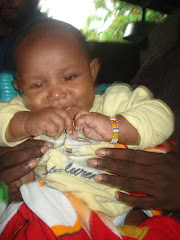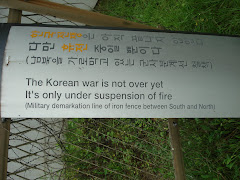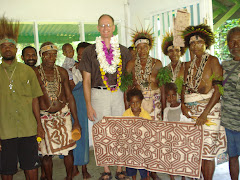Arriving in Port Moresby, I was met by Br. Laurence Hauje, the Regional Minister, and he took me to St. Francis, Koki. This site is where the friars first settled when they went to Papua New Guinea 49 years ago. I had a strong sense of the first Friars coming from England and building the rather extensive parish church and school campus. SSF only lived there about 10 years, and the parish was taken over by the diocese. Unfortunately precious little maintenance has been done in the last 50 years, so the buildings are in deplorable shape. Nevertheless the students from St. Francis do exceptionally well and many of the leaders of modern PNG were students at this school. About 10 years ago Br. Clifton Henry became the parish priest and the brothers returned to the parish. although the current priest is not a brother, the friars work in the parish and offer RE classes at the school.

Each morning the students gather for their morning assembly, which includes singing the school song and the Papua New Guinea national anthem.
After just a few days at Koki, I flew over the mountains to the eastern side of the peninsula to Oro Province (the first posting on this blog describes the "Disaster" which destroyed the infrastructure of the province).
The brothers
 arranged for a welcome for me, including several local SSF Companions and Tertiaries. The friary at Haruro is in many ways the "Mother House"of SSF work in the Pacific. Today the friary is the training house for the region, and the postulants and novices begin their time with us there. They have lectures and workshops in the morning and in the afternoon they work in the gardens, raising food.
arranged for a welcome for me, including several local SSF Companions and Tertiaries. The friary at Haruro is in many ways the "Mother House"of SSF work in the Pacific. Today the friary is the training house for the region, and the postulants and novices begin their time with us there. They have lectures and workshops in the morning and in the afternoon they work in the gardens, raising food.Friday night I went to Newton Theological College where I spent a wonderful evening with Br. Oswald and Br. Selwyn Suma who are studying for ordination. Some of the other single men joined us for sandwiches and pineapple slices, and we had lively conversation about their studies and the work they hoped to do in the future as franciscan priests.
On Monday March 10 we traveled to Katerada, so could spend the night with the brothers there. I had neglected to charge my camera battery, so I have no photos of it, but the brothers have an extraordinary ministry of hospitality to the people displaced by the November flooding. Five families live with the brothers in the friary, and the parish priest lives with his family in the garden gazebo/rest house. Meals are a community effort, and we said the offices sitting outside on chairs so as not to disturb the babies sleeping. Every day the brothers work with the refugees, visit people in the local health clinic as well as visiting parishes in the larger area. In addition to providing emergency housing during the crisis, the brothers gave away huge amounts of food.
I returned from Katerada Tuesday afternoon.

That night one of the novices, Br. Allan, (at right) went out hunting for a pig for my farewell dinner, and as luck would have it he speared a pig caught rummaging around in their sweet potato patch. His cry brought all the brothers running and they helped prepare the pig. I didn't hear the cry, or didn't distinguish it among all the many strange sounds at night. I only learned about the hunt the next day.
Wednesday morning, Br. Wallace, the Guardian, took me on a local transport to Martyr's School where Brother Robert and Brother Anthony are school Chaplains. We had to travel on the back of a large truck because most of the bridges are out and we had to drive through the rivers.Martyr's School was one of the first Anglican schools in PNG, built after WWII, and named after the men and women (all were missionaries, both nationals and ex-pats) who were held captive and then killed with bayonets by the Japanese. Because of the devastation caused by the floods, the school term was only just beginning, nearly five weeks late. As Chaplains, the brothers teach religion courses and re available for counseling with the students. Many of the brothers have done this job, and as we traveled around PNG in the next few weeks, we were often greeted by young adults who had been students at Martyr's School.
The farewell dinner featured the delicious pig and dozens of other dishes prepared by the brothers and their friends. It was a happy time with gifts, speeches and singing.
Friday March 14 we flew to Alotau, to Ukaka Village to receive the First Profession of Vows by Br. Dudley Adia and Brother Gabriel on Palm Sunday. The weekend was spent gathering stones for the ovens (called muu-muus in this part of PNG), killing the pig, gathering coconuts and other provisions. Finally the big day arrived. It was the first time I'd received brothers' vows and it was a big deal! They were trembling and stammering as they said their vows. I was a basket case myself; bless their hearts. It was a relief to come out of church to a huge picnic feast.
 The brothers' families danced and sang, and tray after tray of food was brought out; Brother Dudley's family and many friends and neighbors had stayed up all night cooking.
The brothers' families danced and sang, and tray after tray of food was brought out; Brother Dudley's family and many friends and neighbors had stayed up all night cooking.We returned to Port Moresby for Holy Week. We all shared in the parish observances, many of us speaking at the Good Friday Stations of the Cross, clambering all over the stony hillside behind the church. Nearly 80 people clawed their way along the route, slipping and sliding: no easy path following the Way of the Cross. Easter Sunday I preached at the parish Eucharist.
 Brother Lukas (at left) and 6 other young people, served as acolytes wearing traditional costumes. The words were pretty much the same as we use in the Episcopal Church, but we were definitely not in Kansas any more!!
Brother Lukas (at left) and 6 other young people, served as acolytes wearing traditional costumes. The words were pretty much the same as we use in the Episcopal Church, but we were definitely not in Kansas any more!!Easter Monday Br. Laurence and I flew to Goroka in the Highlands so I could meet and spend time with Br. Andrew (below, with his cat). Andrew was with the first brothers who came to PNG in 1959 and he has had a remarkable career with the brothers. He became a psychiatrist and for many years worked with the government. He was also part of the Melanesian Institute and wrote and taught on cross cultural work.
 Currently he does mostly forensic psychiatry, interviewing people for the public defender and writing reports for the courts. It is still pioneering work in that country and he has brought a tremendous amount of compassion and mercy into the proceedings for many people.
Currently he does mostly forensic psychiatry, interviewing people for the public defender and writing reports for the courts. It is still pioneering work in that country and he has brought a tremendous amount of compassion and mercy into the proceedings for many people.






No comments:
Post a Comment